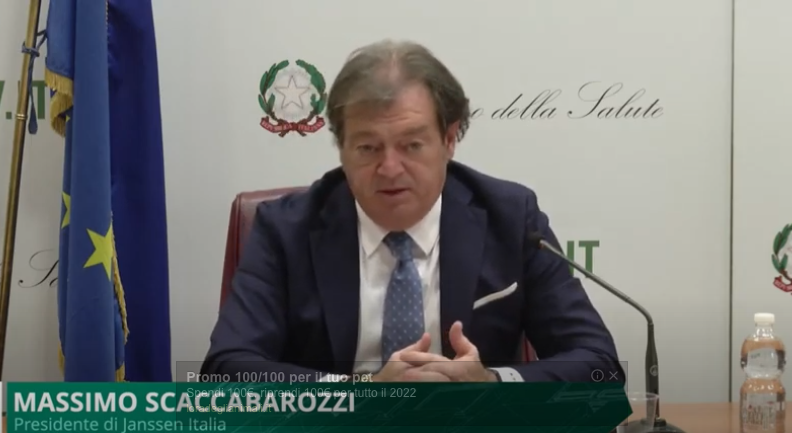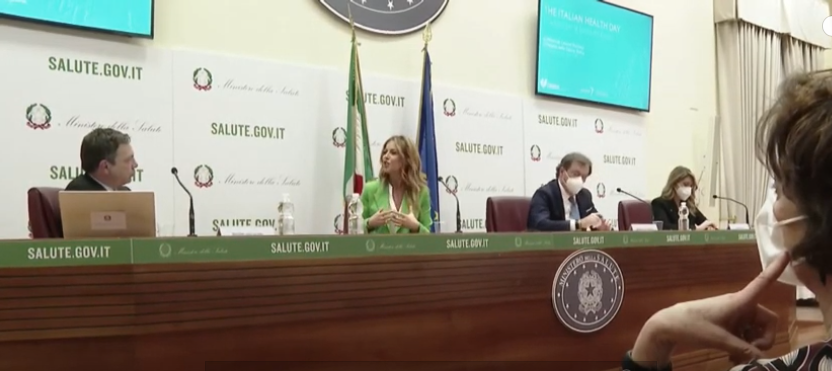The Census report tells the challenges and opportunities for the new health service: the role and professionalism 
La ricerca è stata condotta nell’ambito del progetto ‘I cantieri per la sanità del futuro’, avviato nel 2021 da Censis e Janssen Italia.
All’evento di presentazione del Rapporto sono intervenuti il ministro della Salute Roberto Speranza, Raffaele Donini, assessore alla Salute della Regione Emilia Romagna e coordinatore della Commissione Salute della Conferenza delle Regioni, il direttore generale dell’Agenzia Nazionale per i Servizi Sanitari Regionali (Agenas) Domenico Mantoan, il presidente di Janssen Italia and Head of External Affairs Johnson & Johnson Italia Massimo Scaccabarozzi, il direttore generale di Censis Massimiliano Valerii, il segretario generale di Cittadinanzattiva Anna Lisa Mandorino e Daiana Taddeo, Area Ricerca Nazionale Simg (Società Italiana dì Medicina Generale e Cure Primarie).
The VIDEO of the presentation
THE REPORT
Talking about the healthcare of the near future seen, experienced and desired by citizens, outlining:
The four major players in the healthcare ecosystem and their distinct and integrated action: citizens, doctors, innovators, digital health
The four key challenges of the near future: ageing, health rationing, prevention, equity
An expected result: health value maximization. That is, the optimal balance between higher outcomes, personalization of assistance and care, economic sustainability.
L’82,1% dei cittadini adotta comportamenti salutari (ad esempio buona alimentazione, attività fisica, cautela nel consumo di fumo e alcool).Il 66,9% si informa in autonomia sulla propria salute.Il 66,5% svolge visite
and preventive checks. The 41.6% actively dialogues with doctors by asking questions and exposing its point of view.
Citizens expect: 94.3% greater personalization of care, 92.9% care pathways modulated on their personal needs, from home to the territory, to hospitals.
For 90, 1% close cooperation between states and drug companies in scientific research and testing is essential. For 93.7% public spending on health and healthcare research is an investment and not a cost.
94.0% of Italians expect greater efficacy of treatments and a higher quality of life in the case of chronic diseases. 92,0% expects the discovery of innovative techniques and methodologies to rapidly respond to the challenge of new viruses, bacteria, etc. 91,1% expects a reduction in the risk of falling ill through vaccines, prevention drugs and diagnostic tests early.
70.1% of citizens is ready to make data on their health available for studies, research and experimentation. The 65.0% is in favor of expanded digital health files in which data from the most diverse sources flow, including from devices and wearables used in daily life.
For citizens, it is a priority to enhance skills: for 79.9% of healthcare operators, for 78.7% of patients and family members.
73.2% of Italians trust the Health Service of their Region. 61.0% are convinced that the Health Service will improve, also thanks to the lessons of the pandemic.
RENOVATION
It is the word "fruit salad" of
RESEARCH, INNOVATION, ACTION, RENEW
which in turn recall decisive dynamics for building
health care that maximizes health value.
HEALTH KEYWORDS
La RICERCA e l’INNOVAZIONE
prodotte dagli innovatori sono il motore riconosciuto e apprezzato dell’incessante miglioramento della sanità.
L’AZIONE
recalls change as a result of the active participation of the major players: a collective will to do much better starting from the lessons learned.
RENEW
richiama la convergenza di cittadini e istituzioni sull’opportunità storica di un cambiamento epocale della sanità verso personalizzazione, più alti esiti e sostenibilità economica.
“Dal rapporto emerge un messaggio molto forte indirizzato ai decisori politico-istituzionali: veniamo da un recente passato in cui avevamo creduto di poter gestire i problemi della sanità con la leva finanziaria sia dal lato dell’offerta sia dal lato della domanda. Nel primo caso con tagli, spending review e piani di rientro dei deficit regionali. Nel secondo, invece, ricorrendo alle polizze sanitarie complementari. Oggi, per le sfide che abbiamo di fronte, c’è bisogno di un cambio di paradigma” ha detto il direttore generale del Censis Massimiliano Valerii, nel suo intervento in occasione della presentazione del rapporto
